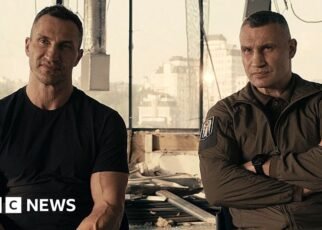[ad_1]
By Steven McIntosh, Entertainment reporter
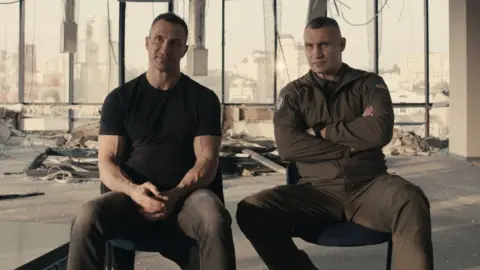 Sky Documentaries
Sky DocumentariesVitali Klitschko was only a year into his retirement from boxing when he was elected mayor of Ukrainian capital Kyiv in 2014.
Eight years later, the former heavyweight champion found himself desperately trying to hold his city together as Russia invaded the country.
A new documentary follows Klitschko, together with younger brother and fellow boxer Wladimir, as he uses his fame to campaign for military support and raise funding in the face of Russian aggression.
Klitschko: More Than A Fight, which opened the Sheffield Documentary Festival on Wednesday, explores the challenges he faced in a war that is still ongoing.
“I wanted to make a film about two celebrities who are using their celebrity to reach a really wide audience,” the film’s director Kevin Macdonald tells BBC News in Sheffield.
“And I was lucky that the two celebrities didn’t happen to be pop singers or something. They are fighters to their core, and obviously the metaphor is hard to resist of them fighting in the ring and then fighting for their country.”
The documentary features new interviews with both brothers, who speak openly about how their high profile has helped them in the war effort.
“Most of us don’t know the names of many presidents [around the world],” Vitali says in the film. “But the names of world heavyweight champions are known to almost everyone on the planet. Sport has opened so many doors for us.”
The Klitschko brothers dominated boxing for a decade. Both were world heavyweight champions, and between them they fought 40 title bouts.
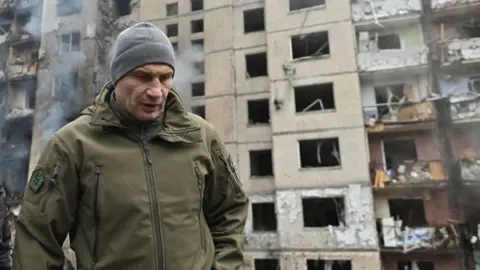 Getty Images
Getty ImagesFollowing his retirement, Vitali was elected Kyiv’s mayor on a pro-European manifesto, winning support for his campaign against corruption after rising through the city’s political ranks during the 2014 revolution.
But he faced his greatest challenge when Vladimir Putin ordered the full-scale Russian invasion of Ukraine in February 2022. The documentary began filming the following winter.
“I was really driven,” Macdonald explains. “It’s the first time I’ve ever made a film out of political conviction and just wanting to do something to communicate the horror of what was going on.”
But the film also spools back to the brothers’ boxing careers – examining their rise, and shining a spotlight on the bond between them.
Jumping between their sporting history and the war of the past two years, Macdonald says, provided some tonal variation to a portrait that is so often bleak.
“Vitali’s day-to-day life in the city is very repetitive,” the director explains. “He’s attending meetings, begging for money, going abroad begging for arms, visiting a building that’s been destroyed.
“So we then started to look more into their past and that became fascinating, learning what drove him into politics.”
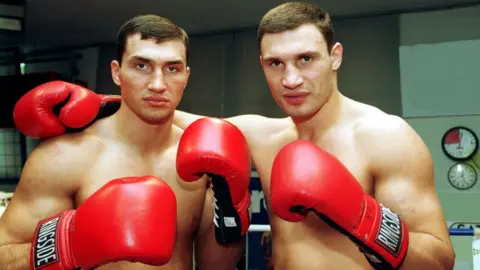 Getty Images
Getty ImagesIn an era when the news agenda moves quickly and coverage of conflicts decreases after the initial weeks, Klitschko’s platform helps him keep the war on the radar.
While Vatali often isn’t able leave the city, Wladimir regularly travels abroad to drum up support – something that has given the younger Klitschko brother a new perspective.
“Before February 24th, I thought I knew myself, but I was wrong,” Wladimir says in the film, referring to the start of the war in 2022.
“What you have achieved in your life, awards, medals, is so unimportant. Now the only question is, what can I do for Ukraine?”
Unlike his brother, he sees himself as an activist rather than a politician, helping to deliver humanitarian and military help for the country.
Their close bond is evident throughout the film. “I was born, he was there,” notes Vladimir. “I don’t even know the time without him.”
“They’re incredibly close,” Macdonald agrees. “But they’re very different. Vitali, when you first meet him, seems quite serious and stern, a disciplinarian. But the more time you spend with him, you realise that he’s got an incredible brain, and is also very warm and lovely.
“Whereas Wladimir is a, I don’t want to say party boy, but on first meeting he’s incredibly friendly and open and chatty and wants to have a good time. And also, I’ve never seen a bond like this where they ask each other about everything and help each other out.”
The film-maker says it took “quite a few months” to chip away at Vitali’s “granite exterior”, but the longer they spent filming, the more he opened up.
It’s clear from the film that Vitali is an instinctive fighter and feels an affinity with those on the front line. “If I wasn’t mayor, it would be me in the place,” he says.
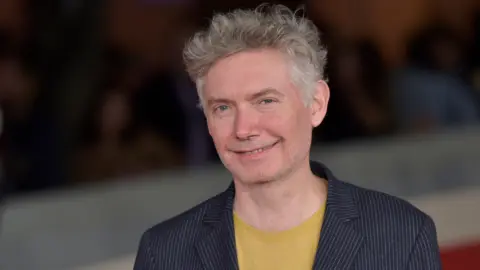 Getty Images
Getty ImagesThe documentary doesn’t shy away from the disputes with Ukrainian president Volodymyr Zelensky.
At one point, when residents of Kyiv are left without power for up to 30 hours, Zelensky says he expects better from the mayor’s office and says they are not doing enough.
Meanwhile, the mayor suggests Zelensky is becoming an autocrat, in comments that pick up news coverage around the world.
The pair are from opposing political parties, although their policies “are not actually that different”, Macdonald notes.
“One journalist in the film says they don’t like each other, and because Zelensky saw Vitali as the bigger celebrity, he was a bigger threat than the other politicians.
“We thought long and hard about whether to include that stuff. It’s journalistically fascinating… but is this damaging to people’s perception of Ukraine?
“I didn’t want it to be, but I thought it was indicative – the fact they can have this open dispute, and that they can slag each other off in the media, to me is a sign that Ukraine is a democracy.”
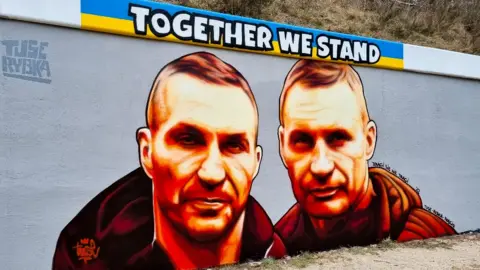 Getty Images
Getty ImagesZelensky’s team did not respond to the documentary team’s request to take part or comment. But Mykhailo Podolyak, an adviser to the president, sat for an interview.
“Here, many people who get to a certain position of power overestimate their importance,” Podolyak says of Vitali. “Many of them become addicted to the thrill of success or failure. In Mr Klitschko’s case, he clearly has ambitions to compete for the top job.”
Later in the film, Vitali is asked directly whether he does indeed have ambitions to become Ukraine’s president, “and he gives a classic politician’s non-answer answer”, Macdonald laughs. “Which I take to mean yes.”
But the director is in no doubt that Klitschko’s intentions are primarily in the best interests of his country.
“[Vitali] is 100% doing the best for his city and his country, I have nothing but admiration for the way this man works, sleepless night after sleepless night, getting up in the middle of the night endlessly to go where has been bombed, or driving hours across the country to go and deliver drones and sleeping in the car.
“He is so dedicated, and he leads this very frugal, almost monastic life. There’s no pomp or show.”
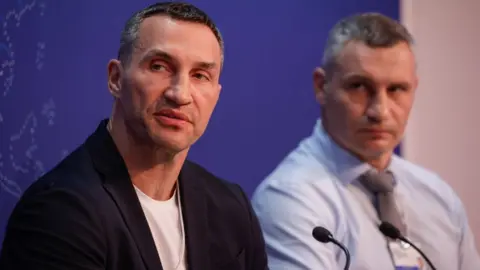 Getty Images
Getty ImagesMacdonald says he did not feel in any danger while filming in Ukraine, and praises an app that alerts citizens when there is an incoming missile attack, giving them a few minutes to get to safety. “We ended up mostly sleeping in the basement,” he says.
Instead, the main thing he felt was “just exhaustion”. He says Russia often times the attacks through the night so Ukrainians’ sleep is interrupted. “So the whole population is slightly punch-drunk from tiredness,” he explains.
“I was so amazed that Ukrainians didn’t complain about that. They’re obviously more resilient than me.”
Although news coverage of the war continues, it has naturally fallen away from the headlines the longer it has gone on.
“I hope this film plays a part in putting it back up there and making people interested again,” Macdonald says. “That’s the goal of this film.”
Klitschko: More than a Fight will be released on Sky Documentaries and streaming service Now in August.
[ad_2]
Source link freeslots dinogame telegram营销
